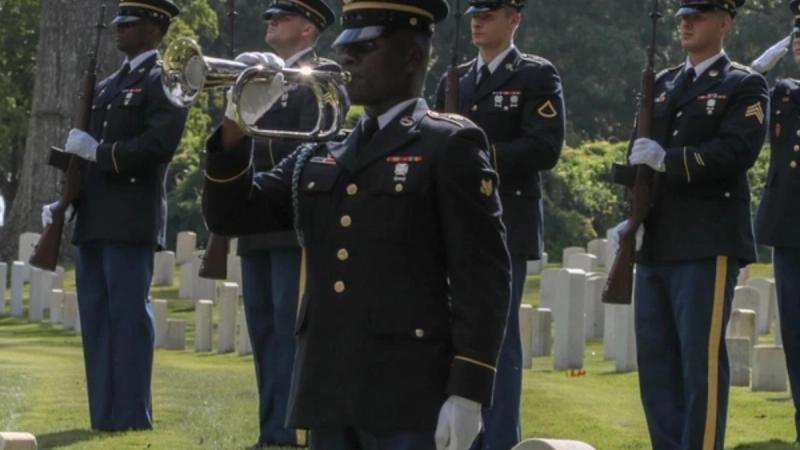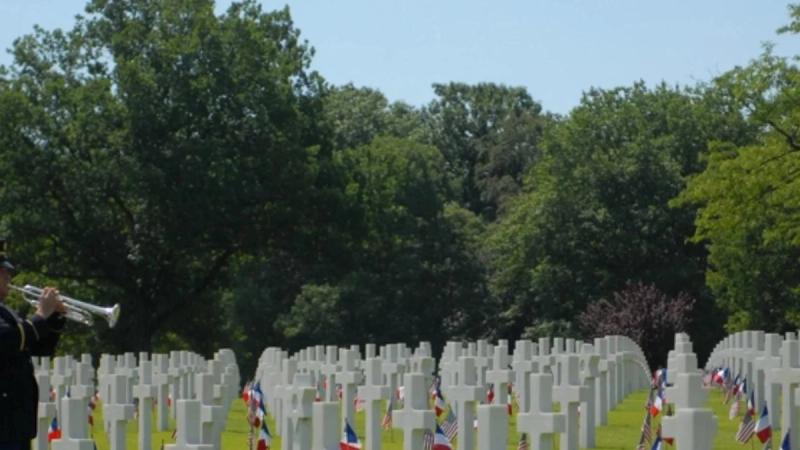TAPS: THE ANTHEM OF MILITARY FUNERALS SINCE THE CIVIL WAR
COMMENT
SHARE

Today, the song “Taps” is played at military funerals for Veterans; however, the tune was originally used for many different reasons. One of the most famous bugle calls has ties to one of the world’s most infamous dictators, a founding family of American Express, and the Civil War.
Major General Daniel Butterfield: Composer of 'Taps'
To understand who wrote the song “Taps,” you’ll need to understand that its history and origins are somewhat debated. Here are a few key facts contributing to the song’s composition:
- The music of "Taps" was published as “Scott Tattoo” in a military manual by Major General Winfield Scott.
- This bugle call, while the precursor to “Taps,” predates what we know today.
- Furthermore, early military manuals also mark “Extinguish Lights” as a traditional bugle call that contributed to the creation of “Taps.” This composition is attributed to David Buhl and has been played since at least the early 19th century.
- Finally, the modern rendition of what we know as “Taps” today was a song written by Union General and Medal of Honor recipient, Daniel Butterfield.
Known at times as "Butterfield's Lullaby” or "Day Is Done," a mis-contribution to what many mistakenly believe to be the first lyrics of the song, “Taps” is tied to these traditional military compositions but has evolved over the years.

Extinguish Lights
Known as Napoleon Bonaparte's favorite bugle call, “Extinguish Lights" or “To Extinguish Lights” is the English translation of Buhl’s French song “Pour Eteindre les Feux” or “L'Extinction des Feux.”
It was used by France since 1804; however, during the Civil War, both sides would also use the call.
Interestingly enough, due to the formal nature of the call being applied to tell troops to go to bed, an evolution would once more transform the tune.
Scott Tattoo and General Daniel Butterfield
Daniel Butterfield was known for his business acumen, tactics on the battlefield, and financial prowess.
Not only would he work in the U.S. Treasury but he worked at his father’s business before serving in the Civil War—his father was a co-founder of American Express.
After suffering an injury during the Battle of Gaines' Mill, the Brigadier General would find himself writing the military song “Taps” while recovering—or at least revising what was used before.
While Gen. Butterfield did not originally write the tune, his contribution to its history comes down to a couple of key facts as well:
- He replaced the use of “Tattoo” to end the day with “Taps” because it was too formal.
- Furthermore, the song was implemented into military funerals to avoid the mistake of “hearing enemy fire” which would actually have been rifle volleys during burial services.
During the Civil War, these applications began to gain popularity not only with Union fighters but also among the Confederacy. The rest is more or less history.
Today, there are even “Taps” song lyrics added to the composition that is tied to both a literal rest at the end of the day as well as eternal rest due to its application at military funerals and memorial ceremonies.

Historical Adoption of 'Taps' in U.S. Military Funerals
It’s hard to say for certain when the Army first used “Taps” as a song for funerals, despite its popularity among multiple branches these days.
However, in 1862, Captain John Tidball is credited with being the first person to use the song at a funeral to substitute the normal rifle volleys common at the time.
Once the Civil War was finished and the threat of confusion was over, both “Taps” and the volleys were implemented in such ceremonies while being added later to Memorial Day and Veterans Day ceremonies as well.
Despite these early ties, the first official recording of requiring "Taps" at a military funeral can be traced back to the 1891 U.S. Army Infantry Drill Regulations.
From Europe through the Civil War and currently in modern times, no matter what you call the song, “Taps” is one of the most well-known, military-related compositions you’ll find just about anywhere.
Suggested reads:
- Rations and Resilience: World War 2 Thanksgiving Traditions That Spread Gratitude
- Unlocking Veteran Benefits: Upgrade Your Discharge Status Through VA Legal Services
- Andrews’ Raiders Stole a Civil War Train, Earning the First MOH
Sources:
NPR. Accessed October 2024. https://www.npr.org/2011/05/30/136721508/historian-explains-the-origin-of-taps
AUSA. Accessed October 2024. https://www.ausa.org/history-taps
Join the Conversation
BY BUDDY BLOUIN
Buddy Blouin is a Contributing Writer at VeteranLife.com
Buddy Blouin is a Contributing Writer at VeteranLife.com



